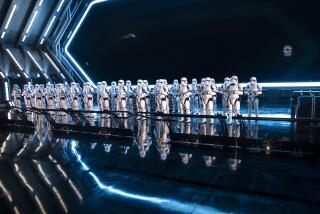Embattled Galoob Toys Wins Infringement Suit Brought by Nintendo
- Share via
SAN FRANCISCO — Lewis Galoob Toys Inc., battling a string of quarterly losses caused by sluggish sales, Friday claimed victory in a year-old copyright infringement case brought by Nintendo of America Inc., the giant video game marketer.
U.S. District Judge Fern Smith in San Francisco alerted company officials late Wednesday that she would allow the firm to resume making and selling Game Genie, Galoob officials said. Game Genie is a video game enhancer that connects to Nintendo cartridges and allows users to customize their play.
Nintendo, which expects U.S. retail sales of its systems and games to hit $4 billion this year, had sought to ban Game Genie permanently, contending that it violated Nintendo’s exclusive right to control its own game displays and related products.
Game Genie was to have gone on sale last July for about $50, but the court ordered Galoob to stop production until a ruling was issued. The South San Francisco company said its device should be on toy-store shelves by the end of summer.
The ruling is potentially quite significant for Galoob, which had counted heavily on the product to be a winner during the 1990 holiday period.
And it marks another setback for Nintendo, which earlier this year settled, without admitting guilt, a Federal Trade Commission complaint alleging price fixing. Nintendo reportedly remains under investigation for allegedly using its product design and licensing policies to lock others out of the business.
For Galoob, the ruling is the second dramatic development in a week. At the annual meeting on June 28, David Galoob, son of the founders, abruptly resigned as chairman, president and chief executive.
Smith, who heard the case in April, ruled that Game Genie does not infringe on Nintendo’s copyrights, said Steven M. Klein, Galoob’s executive vice president, general counsel and chief administrative officer.
“The court has completely vindicated our position, and we expect to begin shipping Game Genie in 30 to 60 days,” Klein said.
Nintendo, a Redmond, Wash., unit of Japan’s Nintendo Co., said in a statement that it expects to appeal the decision. Smith told Galoob officials to expect a preliminary written order Monday and a final written ruling late next week.
Analysts said healthy sales of Game Genie could help bolster the sagging fortunes at Galoob, which lost $29.2 million in 1990.
Sales last year shriveled to $127 million from $227.7 million, primarily because of poor sales of Micro Machines, tiny vehicles that are the company’s key product.
Game Genie, developed by a father-and-sons team in Britain, enables users to skip entire game levels or enhance game characters’ powers, allowing them to leap over obstacles.
Lewis H. Alton, managing partner of L. H. Alton & Co., a San Francisco brokerage, said Friday that “there is no way to view this (Game Genie ruling) except positively.” Aside from having had “a bad year” in 1990, he said, Galoob is “fundamentally . . . very sound, and its new products are doing well.”
The company said it is too soon to say how well Game Genie will do. But in documents presented to Smith, Galoob estimated that it would have sold at least 1.5 million units in the first year.
However, Klein noted that the $5-billion video game market is subject to fast shifts. One uncertainty is how successful Nintendo will be in marketing its more powerful--and expensive--advanced video game system, Super Nintendo.
The new 16-bit system, expected to hit stores by Christmas, would render the old 8-bit systems obsolete. A Galoob spokesman said the company is considering development of a Game Genie for the advanced system.
Reached at home Friday, David Galoob said that, as the company’s largest shareholder, with about 10% of the stock, he was pleased by the ruling.
In New York Stock Exchange trading, Galoob shares rose 87.5 cents to close at $5.
“It’s a great day for Galoob,” he said.
Travails in Toyland
The legal struggle with Galoob is one of several court cases involving giant Nintendo, which controls more than 80% of the video game market.
* American Video Entertainment Inc. of San Francisco sued Nintendo in January in a $105-million antitrust suit charging that Nintendo used monopolistic power to lock American out of the video game market. The suit is pending.
* In early April, Nintendo settled a complaint filed by the Federal Trade Commission and attorneys general in New York and Maryland, alleging price fixing. The company did not admit guilt in the matter.
* A week later, five purchasers of Nintendo video game products filed a class-action antitrust suit in Santa Clara County against Nintendo and unnamed retailers, leveling similar price-fixing charges.
* Just last month, Nintendo filed complaints in the New York area against several retailers and distributors of allegedly counterfeit Nintendo video game products.
* On Wednesday, U.S. District Judge Fern Smith in San Francisco told Lewis Galoob Toys that it could manufacture and market its Game Genie product, ending a year-old copyright infringement case brought by Nintendo. Nintendo said it will appeal the ruling.
More to Read
Inside the business of entertainment
The Wide Shot brings you news, analysis and insights on everything from streaming wars to production — and what it all means for the future.
You may occasionally receive promotional content from the Los Angeles Times.










